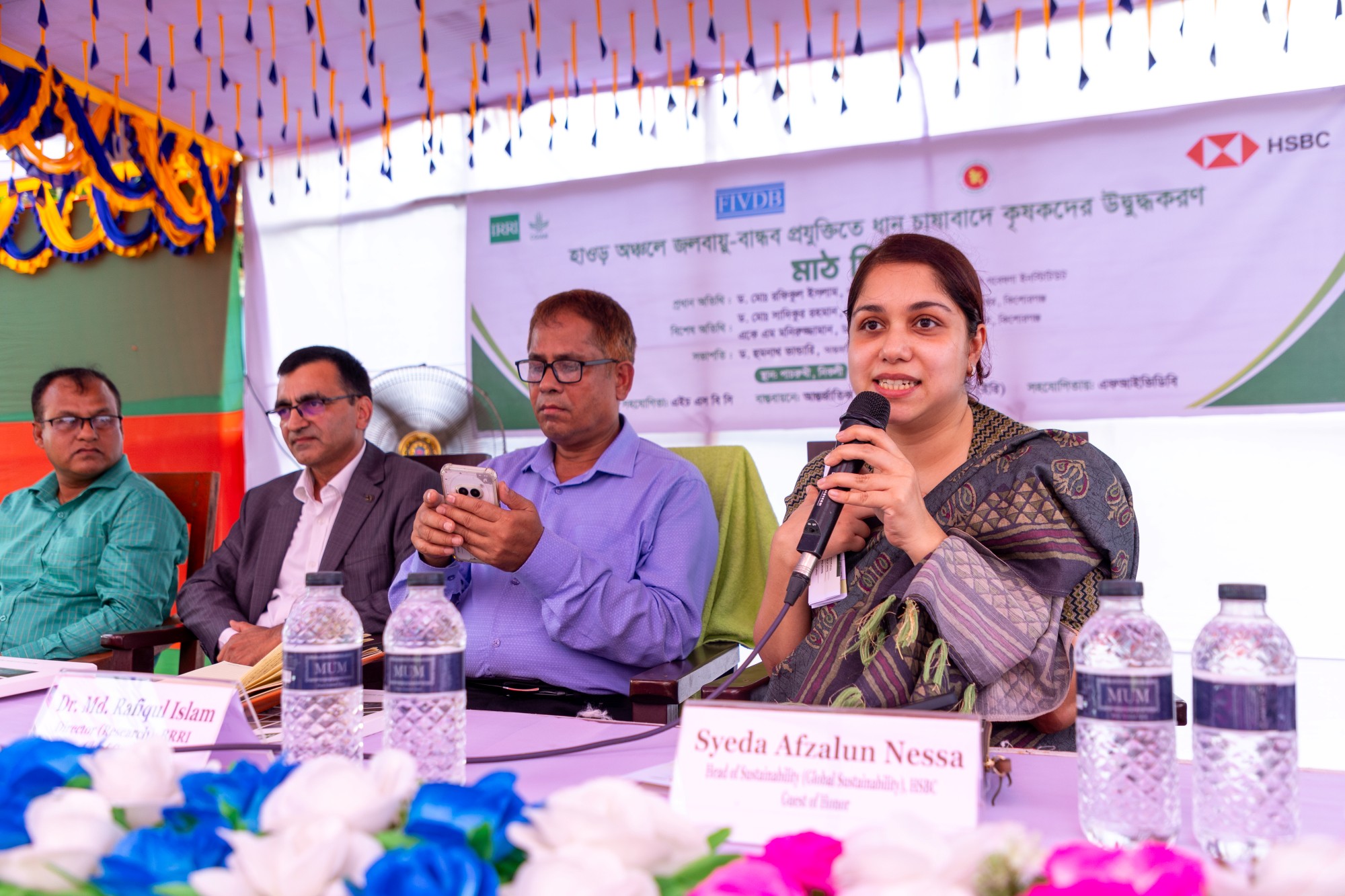IRRI and partners empower haor farmers with climate-smart innovations to improve productivity, resilience, and livelihoods in rice farming.
Nikli, Kishoreganj (22 April 2025) – Bangladesh’s haor region, responsible for 25% of the country’s boro rice and 15% of annual rice production, is increasingly vulnerable to climate shocks, old technologies and practices, and systemic gaps in the rice value chain.
The Climate-Smart Rice Value Chain (CS-RVC) Project, led by the International Rice Research Institute (IRRI) and through HSBC’s philanthropic support, addresses these challenges by introducing innovative, scalable solutions tailored to the haor context and challenges. Friends in Village Development Bangladesh (FIVDB), a local NGO, is implementing the project on the ground.
To showcase these interventions, IRRI organized a Farmers’ Field Day in Pachrukhi, Nikli, Kishoreganj on 22 April 2025, gathering over 150 farmers and more than 40 researchers, government officials, millers, private sector officials, and other stakeholders. Participants firsthand observed and explored field-tested technologies and practices to build a more resilient, sustainable rice economy in the region.
Haor region’s agricultural contribution
“Bangladesh’s food security depends heavily on the haor region’s boro rice production, yet the farmers here are the most exposed to climate and market shocks,” said Dr. Humnath Bhandari, Country Representative, IRRI. “We’re co-developing and scaling solutions with farmers to align research, community input, and institutional support for a truly resilient rice value chain.”
Dr. Md. Rafiqul Islam, Director (Research), BRRI, added, “Haor is a highly productive area. It impacts the country’s food supply significantly. We must collectively explore solutions with other organizations and farmers to strengthen irrigation, improve seed systems, and scale agricultural mechanization.”
Building on the call for integrated action across the sector, Dr. Md. Sadikur Rahman, Deputy Director, DAE, Kishoreganj, acknowledged the role of collaboration, “Thanks to HSBC and IRRI for initiating this impactful project. As extension professionals, we are committed to helping farmers adopt new technologies and close the last-mile gap. DAE will scale the validated innovations.”
“This climate-smart project has introduced new machines and better varieties. We are working to bring more improved seeds to the region to enhance resilience,” AKM Moniruzzaman, Deputy Director (Seed Production), BADC, noted.
“At HSBC, we recognize the vital role of sustainable agriculture in ensuring food security and building resilient communities. As part of HSBC’s philanthropic support for the agriculture sector, we are proud to contribute to the Climate-Smart Rice Value Chain Project. It’s inspiring to witness how innovative practices showcased at the Farmers’ Field Day in Haor are empowering farmers to adapt to climate change and enhance their livelihoods,” Syeda Afzalun Nessa, Head of Corporate Sustainability, Global Sustainability at HSBC in Bangladesh.
Bazle Razee Mustafa, Executive Director of FIVDB, emphasized the region's vulnerability, “The haor region is monocropped and heavily climate-dependent. In 2017, massive floods devastated the area. This project emerged from the need to build long-term resilience for rice farmers in the Haor Region.”
Making haor region’s rice value chain more climate-smart
The CS-RVC Project addresses core challenges such as lack of access to improved rice varieties, quality seeds, poor mechanization, post-harvest losses, traditional crop management, and limited knowledge on innovations. It promotes improved rice varieties like BRRI dhan96 (short duration), 101 (slender grain), 104 (aromatic), and 105 (low glycemic), and introduces other technologies like Alternate Wetting and Drying (AWD) irrigation, crop clinics, and mechanized tools. It trains farmers on the use of innovations.
Field discussions revealed how farmers preferred BRRI dhan96 over older varieties like BRRI dhan28 and 29 due to its early maturity and pest resistance. Farmer Khairul Islam shared, “This is the first time we are trying AWD. It helps us save electricity and reduce labor costs. We need more training and access to harvester machines.”
The project also established community seed banks, allowing farmers to save quality seeds, available on time, and reduce input costs. Farmers expressed enthusiasm for maintaining their own seed systems, contributing to biodiversity and long-term sustainability.
IRRI’s Assistant Manager (PCI), Rehana Noor, emphasized the project’s integrated and whole system approach to overcoming critical gaps in the haor rice value chain. She noted that interventions such as crop cafeterias for variety trials, seed banks for enhanced seed access, educational crop clinics, and mechanization initiatives are tailored to the needs of farmers. “By combining innovation with grassroots engagement, we aim to improve productivity, enhance climate resilience, reduce costs, and foster local entrepreneurship across the value chain,” she said.
The CS-RVC project runs from 2024 to 2027 in five upazilas of Kishoreganj and Sunamganj Districts. It aims to benefit over 10,000 farmers . IRRI and partners will continue engaging with local communities to expand adoption and scale successful innovations.




